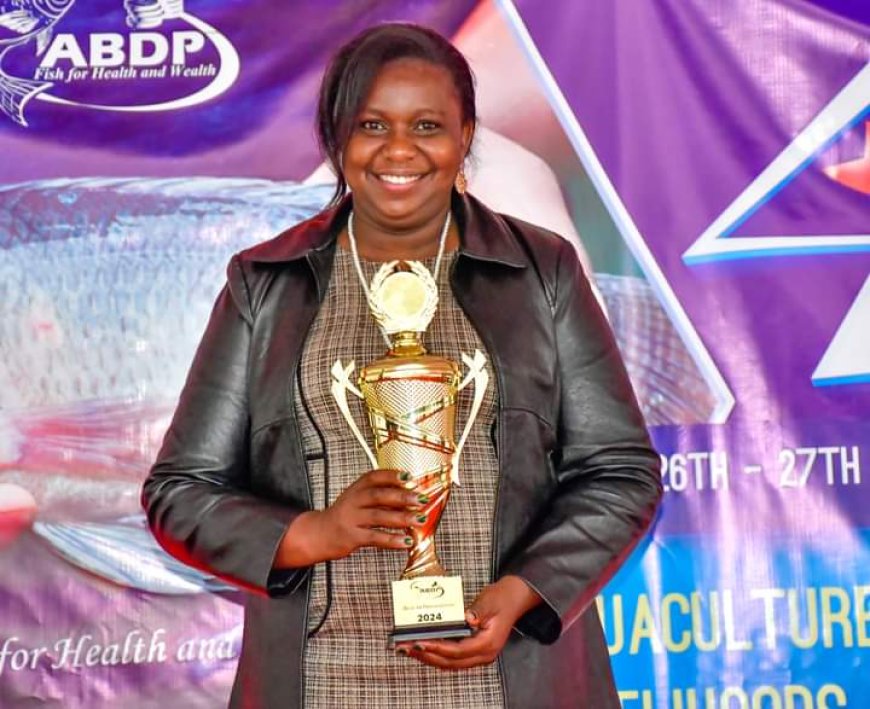Nyeri county ‘fish eating campaign’ on course

Nyeri,
Wednesday July 10, 2024
KNA by Samuel Maina
The County Government of Nyeri is undertaking an aggressive aquaculture program that will see fish farming become an entrenched culture among locals.
Through the Aquaculture Business Development Program (ABDP), the county has seen the number of fish farmers increase from 2,000 in 2013 to 3,192 to date.
And while the majority of the residents of the county are not associated with fish eating, there is an emerging trend in major towns and homes where many people are now embracing fish eating as part of their daily meals.
ABDP is a program jointly funded by the Government of Kenya and the International Fund for Agricultural Development (IFAD).
Its overall goal is to reduce poverty and increase food security and nutrition in rural communities.
“When we came around in 2013 we had around 2,000 fish farmers but this figure has now risen to 3,192. We have seen the number of fish farmers in Nyeri increasing. We have been doing the fish-eating campaign to make sure Nyeri county knows how to eat fish and try to change the culture although it won’t be 100 per cent successful,” says Muareen Gathiga, an ABDP program officer in Nyeri.
“If you look at Nyeri today you can see an increase in the number of fish eateries in almost every town and street. This was not the case before. Today major hotels within our towns are also offering fish on their menu. Most of the fish have been bought from within the county while the rest come from other ABDP implementing counties,” she told KNA.
The county government is also constructing a modern open-air market in Chaka town where farmers will be selling their fish to clients.
Ms. Gathiga says the market is expected to be completed before the end of this year.
Among those targeted to benefit from the new market include women and youth groups currently undertaking projects on aquaculture.
Last week Nyeri emerged as the best county in aquaculture innovation during the 4th ABDP annual National Stakeholders Review Workshop held at the Northwood Hotel in Mukurwe-ini.
The ranking followed the county’s spectacular presentation on the use of a sawdust hatchery system, greenhouse, and Recirculating Aquaculture System (RAS) in fish farming.
In a recirculating aquaculture system, the water used to raise fish is continuously purified in order to be recycled back for use.
Waste products like solid matter, ammonium, and carbon dioxide are either removed or converted into non-toxic substances.
The clean water is then replenished with oxygen and sent back to the fish tank.
The officer has attributed the recognition to concerted efforts by the county government, relevant stakeholders and the farmers at the local level.
She also says the success of the program has been made possible by intense campaigns in the grass roots that has seen a total of 60 fish eating campaigns being undertaken in the eight sub counties to date.
“We have seen our Governor (Mutahi Kahiga to the farmers to stock fingerlings and monitor how farmers are doing which is part of the reason we have won the trophy. Last year we won another trophy on coordination and support given to fishers. The number of times our officers meet the farmers are recorded and afterwards send their coordinates. The more the number of field visits made, the more you are active,” she says.
Kenya annual fish production currently stands at 150,000 metric tonnes against a demand of 400,000 metric tonnes.
According to Farm Africa, a UK-based charitable organization that works with farmers, pastoralists and forest communities in eastern Africa, the declining supply of wild caught fish in the country has led to a reduction of the per capita consumption of fish from 6.0 kg per person per year in 20002 to 4.3 kg in 2017 against the 9.7 kg average for Africa.
Courtesy; KNA
What's Your Reaction?



































































































































































































































































































